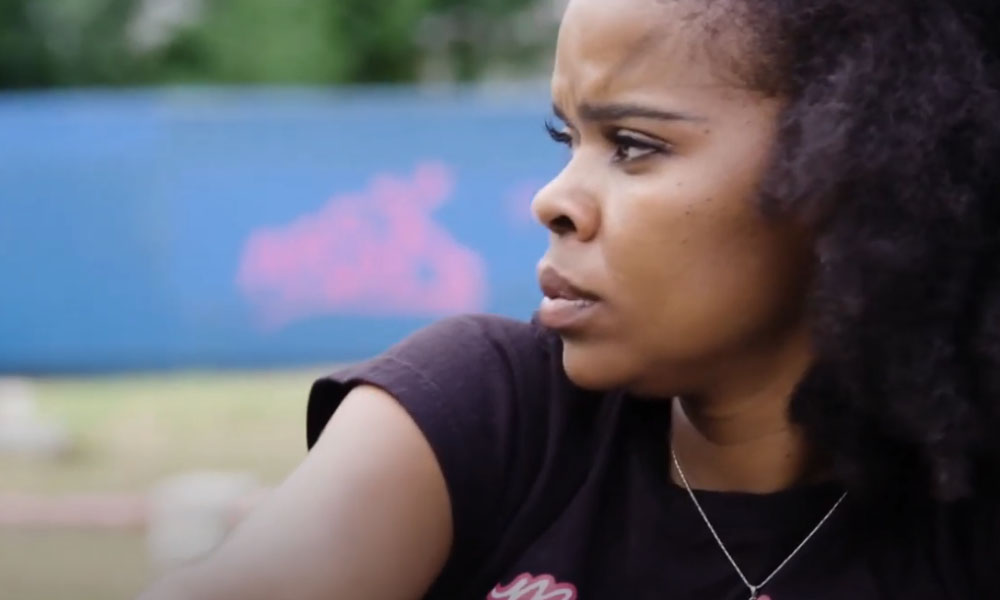They Ain’t Ready for Me
Release: January 23, 2020
1 hour 29 minutes
Feature documentary
What’s the answer to Chicago’s epidemic of gun crime?
According to Tamar Manasseh, the subject of the new documentary They Ain’t Ready for Me, which chronicles her fight against gun violence on the south side of Chicago, it’s, “Nobody wants to shoot anybody’s mother.”
On screen, we meet Tamar in 2018, sitting on the corner of 75th Street and South Stewart Avenue in the Englewood district on the south side of Chicago. Here, she and a group of other mothers sporting vivid pink T-shirts emblazoned with the words “MOMS on PATROL” position themselves every day from the start of summer break until Labor Day.
Tamar is the founder of MASK—Mothers/Men Against Senseless Killing—a group of local volunteers who believe that, together, they can put a stop to the mindless gun crime plaguing their neighborhood, simply by their presence sitting on a local street corner. The group formed after 34-year-old mother Lucille Barnes was killed, and two other women wounded, in a 2015 shooting on a corner of her neighborhood. As a single mother of two, Tamar was terrified by the prospect of her own children ever dying needlessly in the same random fashion. If people got to know one another, she believed, then the senseless shootings would stop.
Tamar is a mesmerizing presence, the living embodiment of tikkun olam. In addition to being a community leader, she is also a rabbinical student. At her synagogue, Beth Shalom B’nai Zaken Ethiopian Hebrew Congregation, she leads services, reading in Hebrew from the Torah. “How does this book, this 5,000-year-old book, what does it do for my life in 2018?…This is the guidebook for living, the rules. It’s hard being a Jew, it’s hard. But you have a whole lifetime to figure it out,” she says.
And yet this inspirational female Jewish leader finds obstacles continuously put in her path to ordination by the International Israelite Board of Rabbis, the rabbinical body for Hebrew Israelites. Her simple question is: “If Judaism is matrilineal, why is it you won’t ordain women?” Her rabbi, Capers Funnye (cousin of former First Lady Michelle Obama), can only sympathize with Tamar’s frustration. He wants her to become a rabbi but finds that the elders of the community are not ready to vote in favor of female ordination at their board meeting. He tells viewers his sincere wish is that in due course a vote will allow women “to serve our community throughout this country and eventually…around the world.”
Tamar’s community suffers from grinding poverty, acute deprivation, widespread addiction problems, scant employment, street gangs and high crime rates. By sheer force of personality, this single African American Jewish mother gathers around her a loyal group of locals who provide a safe place for neighborhood children to play and community members to congregate, find food and water, and hold cookouts, dance parties and celebrations. They are responsible adults on the lookout for potential tensions that might disrupt the neighborhood—the eyes and ears ready to sort out problems as they arise.
Their very presence on the corner of 75th Street and South Stewart Avenue demonstrates that someone cares about the young people and that everyone’s life has meaning. On the street corner, Tamar also celebrates Sukkot, builds a sukkah and, holding a lulav (palm frond) and etrog (citron), describes the story of the Israelites fleeing Pharaoh’s Egypt. At Passover, she conducts a seder for 75 people, tells the story of the Exodus, complete with karpas, charoset, chicken soup and matzah balls—even an Afikomen—and explains, to somewhat mystified locals, that this is the “Thanksgiving of Judaism.”
As she clearly spells out her message to a 5 News TV station interviewer who arrives to film the seder, “We want people to see how easy it is. We’re not driving for miles, we’re not spending a ton of money, we’re just out here caring and that’s what we want people to know. It’s that easy. Anybody can do it.” And she was right. From the start of her project in 2015 up to the end of filming in 2019, no one had been shot in Tamar’s area.
“I want you to be the next state senator…A political position will expand your influence. I’m going to keep bugging you about it,” a perceptive elderly resident tells her. Though Tamar responds that “me and politics don’t mix,” don’t count on that position being set in stone.
To read more of Moment’s Film and TV reviews and recommendations….Click Here

